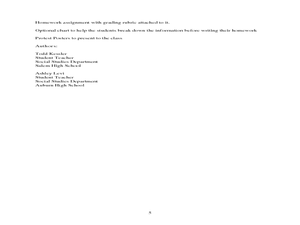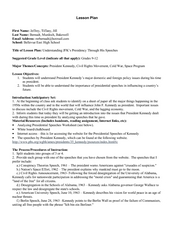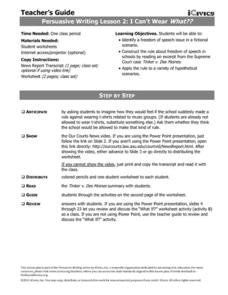Anti-Defamation League
Shirley Chisholm: Unbought, Unbossed and Unforgotten
A 13-page packet introduces high schoolers to a lady of amazing firsts. Shirley Chisholm was the first Black woman elected to Congress, the first Black woman to run for President of the United States, and a leader of the Women's Rights...
Curated OER
1968 – A Generation in Revolt
Tenth graders compare and contrast the revolts that took place around the world in 1968. In this global studies lesson, 10th graders research the youth revolts that took place in Paris, Prague, and Chicago in 1968 and create posters and...
Curated OER
The Cuban Missile Crisis
Students reflect on the events that lead up to the Cuban Missile Crisis in the early 1960s. In this history lesson plan, students explore the conflicts between the United States and the Soviet Union revolving around missiles in Cuba,...
Curated OER
Civil Rights Time Line
Learners create a time line about important events in the civil rights movement of the 1950s and 1960s.
Curated OER
Jazz in America Lesson Plan 7
The student will explore free jazz, fusion, and contemporary jazz. They will listen to avant garde, fusion, and pop recordings. In addition, they participate in a class discussion regarding jazz's contribution to and reflection of...
Curated OER
Understanding JFK's Presidency through his Speeches
Students reflect and discuss the major events that happened in the United States in the 1950's and 1960's. In this U.S. History lesson, students read and analyze the famous speeches during this time frame, then complete a worksheet that...
Sargent Art
Pop Art Sculpture: Food
Pop art food sculptures may look good enough to eat, but don't bite into them! Paying close attention to detail, ninth-graders use modeling clay to sculpt then paint a realistic item of food, reflecting the American popular culture of...
iCivics
I Can’t Wear What?
Can schools ban t-shirts picturing musical groups or bands? Your young citizens will find out with this resource, which includes a summary of a United States Supreme Court case from the 1960s about a similar dispute over students wearing...
Center for Civic Education
Citizenship Schools and Civic Education During the Civil Rights Movement and in the Present
Your young historians will discover the importance that citizenship education has played in the social progress of the United States as they learn about early efforts to discourage African Americans from voting in the 1960s.
Museum of Tolerance
Making Lemonade: Responding to Oppression in Empowering Ways
An activity focused on tolerance encourages class members to consider how they might respond when they or someone else is the target of oppression and discrimination. After researching how some key figures responded to the anti-Semitism...
C-SPAN
Debates
How do the presidential debates of 2016 compare to the debates from the 1980's? What about the 1960's? Evaluate a chosen candidate or issue from the 20th and 21st centuries with a lesson plan focused on political debates. Middle and high...
Stanford University
Lesson Plan: The Children's Crusade and the Role of Youth in the African American Freedom Struggle
Young people played significant roles in the Civil Rights movement. Class members examine the contributions of Barbara Johns, Claudette Colvin, Mary Louise Smith, and the children of Birmingham,...
PBS
Racial Equality: How Far Have We Come and How Far Do We Have To Go?
Is everyone treated fairly in America? The culminating fifth lesson from a series of five has pupils explore racial inequalities from the 1960s and decide whether or not society has changed over time. The lesson comes with a speech from...
State Bar of Texas
Engel v. Vitale
Can you bow your head and pray in school? Scholars investigate the issue of school prayer with the Supreme Court case Engel v. Vitale. A short video clip along with paired group work helps viewers form opinions on the matter. They answer...
Teaching Tolerance
Using Photographs to Teach Social Justice | Confronting Unjust Practices
A powerful photograph of the Freedom Riders of 1961 launches an examination of the de jure and de facto injustices that the civil rights movement of the 1950s and 1960s addressed. Young historians first watch a video and read the Supreme...
National Woman's History Museum
Songs of Protest: Seneca Falls to Vietnam
Long before the songs of the 1960's Peace Movement, long before the songs of the Civil Rights Movement, and even before the songs of the Abolition Movement, were the songs of the Suffrage Movement. To understand the power of protest...
US House of Representatives
Hispanic-American Members of Congress in the Civil Rights Era, 1945–1977
New ReviewDebates around immigration in the news are not new, but they are a defining feature of the Hispanic American experience throughout the twentieth century. Looking through the lens of Hispanic Americans in Congress, class members explore...
Center for History Education
Contextualizing a Historical Photograph: Busing and the Anti-busing Movement in Boston
The anti-busing movement in Boston is the focus of a lesson that asks young historians to examine primary source documents to identify the causes and consequences of busing pupils from one area of the city to another in the attempt to...
Newseum
Civil Rights News Coverage: Looking Back at Bias
Not all southern newspapers covered the civil rights movement of the 1950s and 1960s. Young journalists investigate how The Lexington (Ky. Herald-Leader and The Jackson (Tenn.) Sun re-examined their coverage of the movement. After...
Newseum
'The Press and the Civil Rights Movement' Video Lesson
Scholars watch a video featuring journalists who covered the civil rights movement, then respond to questions on a viewing guide. The video features interviews with participants and original news footage from the 1950s and 1960s. In...
Learning for Justice
Mary Church Terrell
Excerpts from an 1898 speech by civil rights activist Mary Church Terrell offers young scholars an opportunity to investigate how Black American women fought for civil rights long before Rosa Parks and the civil rights movement of the...
National Endowment for the Humanities
"Sí, se puede!": Chávez, Huerta, and the UFW
"Sí, se puede!" Cesar Chavez and Dolores Huerta believed organizing farm workers and changing their working conditions were possible. Scholars examine provisions of the Bracero Program, videos, and the United Farm Workers' (UFW) work....
National Woman's History Museum
Gloria Steinem, Feminism and “Living the Revolution"
Excerpts from Feminine Mystique by Betty Friedan and from Gloria Steinem's "Living the Revolution" provide high schoolers an opportunity to study the feminism of the 1950s and 1960s, sometimes called the "Second Wave of Feminism."
National Endowment for the Humanities
Revolution '67, Lesson 1: Protest: Why and How
To some people, protesting is as American as apple pie, but the factors that lead to protests can be as confusing to veteran activists as to today's youth. Revolution '67 explores the riots in Newark, New Jersey as a case study. Using...
Other popular searches
- 1960's Protest Songs
- 1960's Music
- 1960s Space Race
- 1960's Civil Rights Movement
- 1960's Folk Music
- Women's Rights 1960s
- Women's History of 1960's
- 1960s Hippies
- 1960s Projects
- 1960s America
- 1960s Pop Culture
- Culture of the 1960's

























